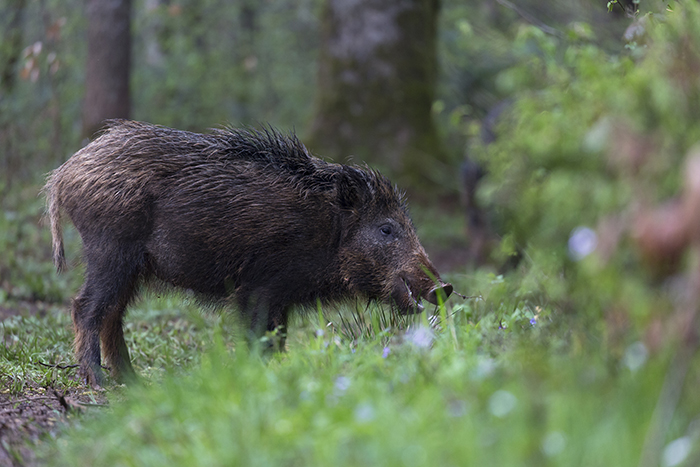According to a study published in The American Naturalist on 6 January 2022, sequences of environmental events over time influence population dynamics in wild species. A research team led by Marlène Gamelon, a researcher at the CNRS1, has studied the influence of sequences of oak mast seeding events over the years on a population of wild boars2, which are major consumers of acorns. Researchers simulated several acorn production cycles and focused their attention on two extreme scenarios: one consisting of alternating years of low and high acorn production, and a second where production is similar from year to year. The team observed that the first scenario, consisting of alternating years of low and high production, appears to contribute to an increase in wild boar populations. In this case, biennial episodes of acorn production coincide with the generation time of wild boar — the average reproductive age of mothers in this population (i.e., two years). This correlation between acorn production cyclicality and generation time has a positive impact on wild boar population growth over time. In the context of global warming, warm and dry springs are expected to favour this type of acorn production in the autumn, with trees alternating between years of production and rest. This study highlights the importance of considering sequences of environmental conditions in order to understand and predict wild population outcomes.

Credit: © Philippe MASSIT / French Office for Biodiversity (OFB)
According to a study published in The American Naturalist on 6 January 2022, sequences of environmental events over time influence population dynamics in wild species. A research team led by Marlène Gamelon, a researcher at the CNRS1, has studied the influence of sequences of oak mast seeding events over the years on a population of wild boars2, which are major consumers of acorns. Researchers simulated several acorn production cycles and focused their attention on two extreme scenarios: one consisting of alternating years of low and high acorn production, and a second where production is similar from year to year. The team observed that the first scenario, consisting of alternating years of low and high production, appears to contribute to an increase in wild boar populations. In this case, biennial episodes of acorn production coincide with the generation time of wild boar — the average reproductive age of mothers in this population (i.e., two years). This correlation between acorn production cyclicality and generation time has a positive impact on wild boar population growth over time. In the context of global warming, warm and dry springs are expected to favour this type of acorn production in the autumn, with trees alternating between years of production and rest. This study highlights the importance of considering sequences of environmental conditions in order to understand and predict wild population outcomes.
Notes
1- From the Biometry and Evolutionary Biology Laboratory (CNRS/VetAgro Sup/Université Claude Bernard Lyon). Scientists from the French Office for Biodiversity (OFB) also took part.
2- Surveys carried out by the OFB since 1983 at the Châteauvillain Arc-en-Barrois research site (Haute-Marne, France)
Journal
The American Naturalist
DOI
10.1086/721905
Method of Research
Data/statistical analysis
Subject of Research
Animals
Article Title
Amplified cyclicality in mast seeding dynamics positively influences the dynamics of a seed consumer species
Article Publication Date
6-Jan-2023




